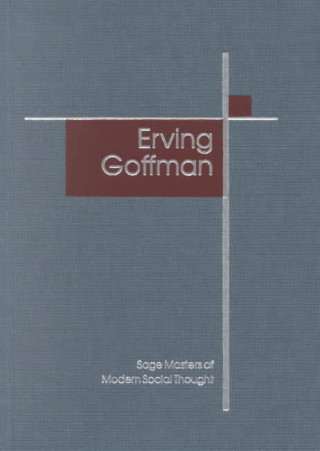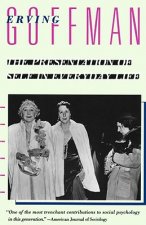
Delivery
Shopping guide





Doesn't suit? No problem! You can return within 30 days
 Gift voucher
any value
Gift voucher
any value
You won't go wrong with a gift voucher. The gift recipient can choose anything from our offer.
Erving Goffman
 English
English
 1990 b
1990 b
 Delivery to Austria
Delivery to Austria
30-day return policy
You might also be interested in


Erving Goffman (1922-82) was an inspirational thinker, and one of the giants of 20th century sociology. Several of his books, notably "The Presentation of Self in Everyday Life" (1959), "Asylums" (1961), "Relations in Public" (1963), "Stigma" (1963) and "Gender Advertisements" (1979) are acknowledged as modern classics. Goffman fundamentally revised how we think of social life. After him, the study of social encounters, behavior in public, the construction and deconstruction of the self, stigma and forms of everyday communication, were never the same again. Without being obviously attached to any discrete research tradition, Goffman drew from the best thought on social interaction, applied it in his fieldwork, and produced a richly satisfying and extraordinarily influential approach to making sense of social life. He was a sociological virtuoso, producing unmatched insights into how life with others is sustained and why forms of interaction break down or cause personal damage. This unparalleled collection, edited by two acknowledged international experts on Goffman, produces a unique reference resource for researchers and students. It consists of the main critical responses to Goffman's oeuvre, offering readers a distillation of the main themes in Goffman's work and explaining how these themes relate to contemporary social thought. The collection is systematic and constitutes a unique asset in understanding this searching and wide-ranging thinker. The four volumes are thematically organized into nine sections. Section 1 - Personal Reminiscences: Goffman became internationally famous during the 1960s and 70s, at a moment when American sociology was growing by leaps and bounds. Although in some ways, an unusually reticent man, Goffman's success made him one of the 'faces' of American sociology during these crucial years in the professional formation of the subject. Because Goffman's methods of analysis are so personal to the man himself, this section is a particularly useful guide to elucidating and applying Goffman's ideas. Section 2 - Biography and Career: In this section Goffman's career is systematically and critically presented.Included are reflections on Goffman's relation to the academic community, his central legacies and his highly daring and revisionist attempt to rethink social encounters and social life. Section 3 - Goffman's Sociology and Modern Society: Although Goffman produced one of the most significant and influential of all contemporary approaches to sociology, the application of his ideas to the central questions of the day is often hard to identify. He was never an overtly 'political' thinker, nor did he engage in utopian theorizing. In this section, the relevance of Goffman's ideas for understanding modern society is pinpointed. Included are considerations of his dramaturgical method, his place in the politics of 60s Sociology, the relation of his ideas to questions of civility and etiquette and a discussion of how Goffman viewed human nature. Section 4 - Methods: Towards the end of his life Goffman sought to externalize the main methodological themes in his work. These had been mainly implicit in his popular writings in the late 1950s and 60s. However, in books like "Forms of Talk" (1981) and "Frame Analysis" (1986) he began to be more concrete about the key methodological elements in his work. This section includes discussions of Goffman's use of the concept of self, outlines the distinctive features of his method and indicates how his thought relates to 'common sense'. Section 5 - Textuality: This section continues the theme of Goffman's methodology, by examining how he understood and applied forms of 'reading' society and, in turn, how his readings have been 'read'. The challenge his work poses to orthodox ethnography, the place of irony in his analysis, the virtuoso character of his sociology and Goffman's innovations and decoding interaction comprise the central themes of this section. Section 6 - Central Sociological Concerns: In this, the most lengthy section of the collection, Goffman's central sociological concerns are investigated. His work on interaction, self, frames, stigma, mental illness and total institutions is critically examined. The section reveals the amazing fertility of Goffman's insights and the astonishing range of his sociological imagination. Above all, a critical understanding of why Goffman is important for sociology, what his achievement constitutes, and the strengths and limitations of his sociology, emerges from these pages. Section 7 - Goffman and the Classical Tradition: Goffman's relation to the classical tradition is explored in this section. Comparisons with the ideas of Cooley, Simmel, Park, Hughes and the Chicago School are identified and elaborated. The section helps readers to understand the nature of the unusual crucible from which Goffman's approach emerged. Section 8 - Goffman and His Contemporaries: Goffman's ideas generated a huge amount of critical discussion in his own lifetime. This section provides readers with a comprehensive guide to Goffman's relationship to the work of Blumer, structuralism, existentialism, Sartre, Elias, Habermas and feminism. Again, the sheer range of Goffman's influence emerges most powerfully. Section 9 - Goffman's Influence on Successors: Although Goffman died in 1982, his work is still a major influence in contemporary social analysis. This section explains how Goffman's ideas have been used in contemporary work on conversation analysis, semiotics, consumer culture, postmodernism and the public sphere. This magisterial collection is a fitting critical tribute to the sociology of Erving Goffman. It enables readers to fully appreciate the achievement and originality of this seminal thinker.
About the book
 English
English


 Contact
Contact How to shop
How to shop

































